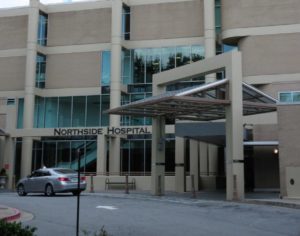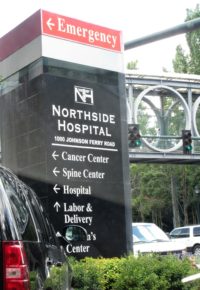Is the nonprofit Northside Hospital Inc. subject to the state’s open records law?
The Georgia Supreme Court on Monday heard arguments on the high-profile case, which involves Northside’s rejection of requests for information about financial documents and other matters.

Attorney Peter Canfield argued that Northside – a financially successful hospital system based in Atlanta – is subject to the Georgia Open Records Act because it was created by a public hospital authority, which is a government entity, and that it operates solely on the authority’s behalf.
The outcome of the legal battle may have a major effect on the Georgia hospital industry, because Northside’s corporate structure resembles many others in the state.
Many hospital authorities, for business purposes, have spun off their hospitals into separate nonprofit corporations over the past three decades. Under such an arrangement, the hospital authority leases the assets of the hospital to the corporation.
These restructured hospitals include large urban facilities such as Grady in Atlanta, along with medical centers in Savannah, Augusta, Macon, Rome and Albany, as well as in the Atlanta suburbs.
Attorney Canfield told the justices Monday that “all the assets and liabilities acquired by Northside Inc. during the term of the lease revert to the hospital authority’’ when the lease ends.

“Everything that Northside does is doing for the authority,’’ Canfield said. “All of Northside’s assets come from the authority.’’
Northside has said it is not bound by the open records law. The hospital says that because it’s a private nonprofit corporation, not a public entity, this particular law does not apply to it.
An attorney for Northside, Randy Evans, told the court Monday that the system is a regional player, owning other hospitals in areas that are not governed by the hospital authority in Fulton County.
“There is no longstanding rule that every [restructured] hospital is necessarily subject to the Open Records Act,’’ Evans said. He said the Georgia Legislature has rejected attempts to change the law to widen access to records involving restructured hospitals.

Canfield, though, cited a 2012 amicus brief filed by the Georgia Alliance of Community Hospitals (Northside is a member) in a U.S. Supreme Court case involving Phoebe Putney Memorial Hospital in Albany. The alliance, he said, argued in the brief that restructured hospitals such as Phoebe Putney are specifically required to adhere to the Georgia Sunshine Laws, in the same manner as local hospital authorities.
The fight over Northside’s records and hospital privacy began in 2013, when attorney E. Kendrick Smith requested information about Northside’s expenditures in the acquisitions of physicians’ practices. The AJC that year reported about patients who faced higher bills after the acquisition of two of these practices.
The hospital turned down the request. The plaintiff, a partner of the firm Jones Day, filed suit, and the case was first heard in Fulton County Superior Court.
The judge ruled in favor of Northside, saying that the hospital authority had nothing to do with the operations and acquisitions of the hospital.
Smith appealed. The court of appeals, in a split decision, upheld the lower court ruling.

The Georgia Open Records Act, known as a “sunshine law,” was created to let the people of the state know what government agencies are doing. Ordinary citizens, lawyers and reporters routinely use the act to find out how agencies make decisions and spend money.
The Georgia Press Association, the First Amendment Foundation, the Savannah Morning News and the AJC have filed amicus briefs supporting the Smith appeal. The Georgia Chamber of Commerce, among other organizations, has sided with Northside.
A decision by the Supreme Court could be months away.

